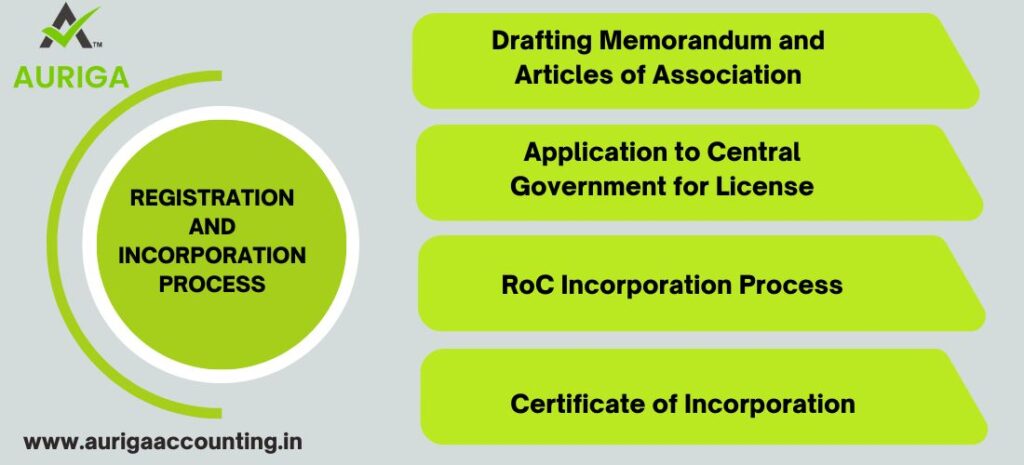
WHAT IS THE PROCEDURE FOR THE INCORPORATION OF SECTION 8 COMPANY?
Introduction
ToggleYOU NEED TO KNOW WHAT IS THE PROCEDURE FOR THE INCORPORATION OF SECTION 8 COMPANY?
The incorporation of a Section 8 companies, in India involves a specific procedure to ensure compliance with the Companies Act, 2013. Firstly, an application for name approval must be submitted to the Registrar of Companies (RoC). Following name approval, the company needs to apply for a license from the Central Government by submitting the necessary documents, including the memorandum and articles of association. These documents must align with Section 8 regulations, emphasizing the company’s non-profit objectives. Once the license is granted, regular incorporation steps like obtaining PAN, TAN, and opening a bank account need completion. The entire process aims to establish a legally recognized non-profit entity dedicated to charitable activities. Visitofficialwebsite
KEY FEATURES OF INCORPORATION OF SECTION 8 COMPANY
- Non-profit Objective: Section 8 companies are not for profit. Any income they generate must be reinvested in furthering their charitable objectives.
- Limited Liability: Members and directors of Section 8 companies have limited liability, protecting their personal assets.
- Name: The name of a Section 8 company must include the words “Section 8” or “Limited” at the end.
- Legal Recognition: These companies have legal recognition, providing credibility and structure for their charitable activities.
- License Requirement: A license from the Central Government is required for establishing a Section 8 company.
- Tax Benefits: Section 8 companies enjoy tax exemptions on income used for charitable purposes.
- Compliance: Strict compliance with the Companies Act and regulatory requirements is necessary.
PROCEDURE OF INCORPORATION SECTION 8 COMPANY
Step 1: Obtain Digital Signature Certificates (DSC)
- The first step is to obtain Digital Signature Certificates (DSC) for the proposed directors and subscribers of the Section 8 company. DSCs are required for online filing and signing of documents.
Step 2: Obtain Director Identification Number (DIN)
- Directors of the proposed company must apply for Director Identification Numbers (DIN) by filing Form DIR-3 online with the Ministry of Corporate Affairs (MCA).
Step 3: Name Approval
- Choose an appropriate name for the Section 8 company. The proposed name must comply with naming guidelines. You can apply for name approval by submitting Form INC-1 to the Registrar of Companies (RoC). Once approved, the name is reserved for 20 days.
Step 4: Draft Memorandum and Articles of Association (MoA and AoA)
- Draft the MoA and AoA for the Section 8 company. These documents should clearly state the objectives and operations of the company. The MoA should include clauses defining the charitable or non-profit nature of the organization. These documents should be prepared in compliance with the provisions of the Companies Act, 2013.
Step 5: Application to Central Government for License
- Prepare and file Form INC-12 (Application for a license under Section 8) with the RoC to obtain a license for the Section 8 company. This form should be accompanied by various documents, including:
- The MoA and AoA.
- A declaration confirming compliance with Section 8 requirements.
- A statement of the assets and liabilities of the company.
- A statement of the estimated future annual income and expenditure for the next three years.
- Any other documents required by the authorities.
Step 6: RoC Incorporation Process
- Once the Central Government approves the license application, the RoC will issue a license. After obtaining the license, you can apply for the incorporation of the Section 8 company by filing Form INC-7 (for incorporation) and Form INC-22 (for address proof) with the RoC. These forms should be filed within 60 days from the date of obtaining the license.
Step 7: Certificate of Incorporation
- If the Registrar of Companies is satisfied with the documents and information provided, they will issue a Certificate of Incorporation. This certificate signifies the official registration of the Section 8 company, granting it legal recognition.
Step 8: Post-Incorporation Compliance
- After the incorporation of the Section 8 company, several compliance-related steps should be followed to ensure its smooth and lawful operation:
- Maintaining Proper Accounts: The company is required to maintain proper books of accounts, which accurately reflect its financial transactions, income, and expenses.
- Conducting Annual General Meetings (AGMs): The company must hold Annual General Meetings (AGMs) to discuss company matters, approve financial statements, and address other relevant issues. Members and stakeholders participate in the decision-making process during these meetings.
- Filing Annual Returns: Annual returns, which include various financial and operational details of the company, must be filed with the RoC within the specified timeframe to remain compliant with the law.
- Ensuring Compliance: The Section 8 company must adhere to the provisions of the Companies Act, 2013, and other applicable laws and regulations on an ongoing basis. This includes timely filing of statutory documents, updating company information, and complying with any changes in the legal framework.
How do I become a Section 8 company member
- Digital Signature Certificate.
- Memorandum of Association.
- Articles of Association.
- Passport Size Photographs.
- Members’ ID proof such as Aadhar Card, Passport, Voter ID.
- Details of Director (When the Members Are Other Companies/LLPs)
- Address Evidence.
What is the procedure for conversion of Section 8 company
the process for the conversion of a Section 8 company in India involves specific steps outlined by the Ministry of Corporate Affairs (MCA). Keep in mind that procedures and requirements may be subject to changes, and it’s advisable to check the latest regulations or consult with legal professionals. As a general guideline, here’s the procedure for the conversion of a Section 8 company:
Board Resolution: The directors of the Section 8 company should pass a resolution approving the conversion and authorizing key actions.
Members’ Approval: Special resolution must be passed by the members (shareholders) of the company to approve the conversion.
Application to the Regional Director (RD): File an application with the Regional Director (RD) seeking approval for the conversion. Include necessary documents such as the resolution, altered memorandum and articles of association, and a declaration of solvency.
Central Government Approval: Upon receiving the RD’s approval, the company should apply to the Central Government for final approval. Provide the approved RD order, altered memorandum and articles, and other relevant documents.
Compliance with ROC: After obtaining Central Government approval, file the necessary forms with the Registrar of Companies (RoC). This includes Form INC-18 for conversion, along with the altered memorandum and articles.
New Certificate of Incorporation: If satisfied, the RoC issues a new certificate of incorporation, signifying the successful conversion of the Section 8 company.
Intimate Concerned Authorities: Inform other concerned authorities, such as income tax authorities, about the change in the company’s status.
It’s crucial to follow the specific guidelines and comply with the latest legal requirements during the conversion process. Consulting with legal professionals or corporate advisors is recommended to ensure accuracy and adherence to regulatory norms.
Do Section 8 companies need GST registration
the requirement for Goods and Services Tax (GST) registration for Section 8 companies in India depends on their annual aggregate turnover. Here are the key points to consider:
Mandatory Registration: If the annual aggregate turnover of a Section 8 company exceeds the prescribed threshold limit for GST registration, it is mandatory for the company to register for GST.
Threshold Limit: As of my last update, the threshold limit for mandatory GST registration for service providers is Rs. 20 lakhs (Rs. 10 lakhs for special category states).
Voluntary Registration: Even if the turnover is below the threshold, Section 8 companies have the option of obtaining voluntary GST registration to avail of input tax credit and comply with the GST framework.
It’s essential for Section 8 companies to regularly check the latest GST regulations and updates, as threshold limits and requirements may be subject to changes. Additionally, consulting with a tax professional or GST consultant can provide accurate and up-to-date information based on the current regulatory landscape.
Which ITR is required for Section 8 company
Section 8 companies in India are non-profit entities, and for the purpose of income tax filing, they are required to use Form ITR-7. Here are key points regarding the income tax return (ITR) filing for Section 8 companies:
Form ITR-7: Section 8 companies should use Form ITR-7 to file their income tax returns. This form is specifically designed for entities that fall under Section 139(4A), Section 139(4B), Section 139(4C), or Section 139(4D) of the Income Tax Act, 1961.
Charitable or Religious Trusts: Section 8 companies, being non-profit entities formed for charitable purposes, are typically considered charitable or religious trusts, and they fall within the scope of Form ITR-7.
Details of Charitable Activities: Form ITR-7 allows these entities to provide details of their charitable or religious activities, including income, expenses, and other relevant information.
Exemptions and Deductions: Section 8 companies can claim exemptions and deductions applicable to charitable entities while filing Form ITR-7.
It’s important to note that tax regulations may be subject to changes, and entities should stay updated on the latest guidelines. Seeking advice from tax professionals or financial experts can ensure accurate compliance with the current tax laws and regulations.
What is an example of a Section 8 company
An example of a Section 8 company in India is the “Infosys Foundation.” Infosys Foundation is a non-profit organization formed under Section 8 of the Companies Act, 2013. It operates as the philanthropic arm of Infosys Limited, one of India’s prominent IT services companies.
The Infosys Foundation focuses on various social initiatives and charitable activities, including education, healthcare, rural development, arts and culture, and relief work during natural disasters. Being registered as a Section 8 company, it is obligated to utilize its funds for promoting charitable objectives and is prohibited from distributing profits among its members.
It’s worth noting that there are many other Section 8 companies in India, each engaged in various charitable endeavors aligned with the objectives specified in their Memorandum of Association.
What is the benefit of Section 8 company
Certainly! Here are four key benefits of a Section 8 company in India:
Non-Profit Status: Section 8 companies are established for promoting charitable or non-profit objectives such as education, social welfare, religion, or art. The primary benefit is their non-profit status, emphasizing a commitment to social welfare rather than profit-making.
Tax Exemptions: Section 8 companies may be eligible for tax exemptions on their income, subject to compliance with relevant regulations. This includes exemptions from income tax and other applicable taxes, providing financial benefits to the organization.
Credibility and Trust: Registration as a Section 8 company provides official recognition, enhancing credibility and trust among stakeholders. This recognition is valuable when seeking partnerships, donations, or collaborations with other organizations, as it assures legitimacy.
Asset Locking and Dissolution: In the event of dissolution, the assets of a Section 8 company must be transferred to another Section 8 company or a non-profit organization with similar objectives. This ensures that the assets continue to be utilized for charitable purposes, reinforcing the organization’s commitment to its mission.
These benefits make Section 8 companies a preferred legal structure for organizations focused on social welfare and charitable activities.

REGISTRATION AND INCORPORATION PROCESS
Drafting Memorandum and Articles of Association:
- The next step is to draft the Memorandum of Association (MoA) and Articles of Association (AoA) for the Section 8 company. These documents should clearly state the objectives of the company, which should align with the non-profit and charitable nature of the entity. Additionally, the MoA and AoA should include various clauses and provisions as per the Companies Act.
2. Application to Central Government for License:
- The core of the Section 8 company registration process involves obtaining a license from the Central Government. To do this, you need to prepare and file Form INC-12 (Application for a license under Section 8) with the Registrar of Companies (RoC) in your jurisdiction. Along with Form INC-12, you must submit several essential documents, including:
- The MoA and AoA
- A declaration confirming compliance with Section 8 requirements
- A statement of the assets and liabilities of the company
- A statement of the estimated future annual income and expenditure for the next three years
- The Central Government is responsible for approving the license, and this stage may involve detailed scrutiny.
- The core of the Section 8 company registration process involves obtaining a license from the Central Government. To do this, you need to prepare and file Form INC-12 (Application for a license under Section 8) with the Registrar of Companies (RoC) in your jurisdiction. Along with Form INC-12, you must submit several essential documents, including:
3. RoC Incorporation Process:
- Once the Central Government approves the license application, the RoC will issue a license for the Section 8 company. After obtaining the license, you can apply for incorporation by filing Form INC-7 (for incorporation) and Form INC-22 (for address proof) with the RoC in your jurisdiction. These forms should be filed within 60 days from the date of obtaining the license.
4. Certificate of Incorporation:
- If the Registrar of Companies is satisfied with the documents and information provided, they will issue a Certificate of Incorporation. This certificate signifies the official registration of the Section 8 company, granting it legal recognition.
HOW AURIGA ACCOUNTING HELP YOU TO INCORPORATION OF SECTION 8 COMPANY
Consultation: Auriga Accounting can provide information and guidance on the legal and regulatory requirements for Section 8 companies.
Registration Assistance: Assistance with the entire registration process, including obtaining a license, drafting necessary documents, and submitting applications to government authorities.
Compliance Support: Auriga Accounting support for compliance with legal and regulatory requirements, such as annual filings and record-keeping.
Tax Advisory: Providing advice on tax benefits, exemptions, and strategies for optimizing financial sustainability.
Financial Management: Offering financial management services and guidance for Section 8 companies.
Audit Services: Conducting financial audits as required by law or as part of good governance practices.
Strategic Planning: Assisting in strategic planning and fundraising efforts to advance the organization’s charitable objectives.












